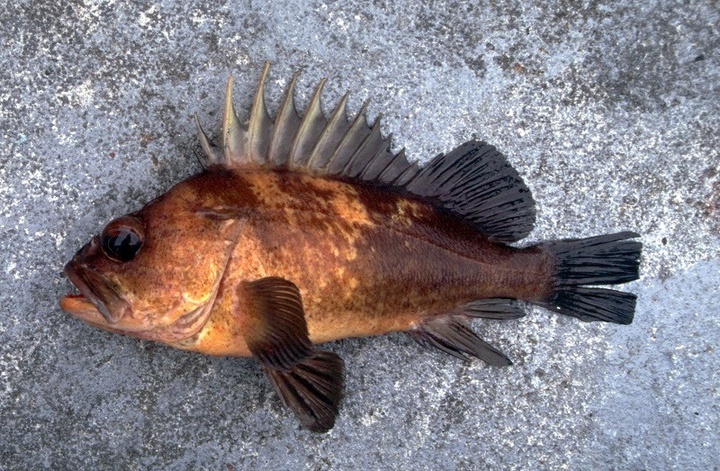Jessica Cejnar Andrews / Monday, Aug. 21, 2023 @ 5:02 p.m.
Crescent City Harbor Commissioners Ask McGuire To Help Modify Nearshore Groundfish Closure Order; County Supervisors Expected to Discuss Issue

CDFW scientists say the 2023 quillback rockfish harvest has exceeded the overfishing limit set by federal regulations. | Photo courtesy of the California Department of Fish and Wildlife
Previously:
• Del Norte Fishermen Are Pissed About Nearshore Groundfish Fishery Closure
###
Crescent City Harbor commissioners hope that State Sen. Mike McGuire can use his influence to modify a recent California Department of Fish and Wildlife decision to close the nearshore groundfish fishery.
At a special meeting Friday, commissioners voted to send a letter to Del Norte County’s state representative asking to reconsider the current 50-fathom — 300-foot — boundary set for the Rockfish Conservation Area. They argued that the quillback rockfish, the species that sparked the closure, are rarely in waters shallower than 10 fathoms. Forcing anglers to venture beyond 50 fathoms places them in danger, commissioners argued in their letter.
Meanwhile local fishing guides continue to argue that the closure, which took effect at 12:01 a.m. Monday, will economically devastate Crescent City and Del Norte County.
“Not one single charter boat captain in Crescent City kept a quillback because we know that it’s vital to our system,” said Steve Huber, owner of Crescent City Fishing. “People come to see our area, people come to get this stuff. Tell Fish and Wildlife we want an answer. My suggestion is everyone has to be involved. There’s no group that’s more special than the other.”
CDFW closed the nearshore groundfish fishery saying that the recreational and commercial quillback rockfish harvest has exceeded an over-fishing limit of 1.04 metric tons, Caroline McKnight, an environmental scientist with CDFW’s marine region, told the Wild Rivers Outpost on Aug. 15.
The information CDFW scientists used to close the fishery comes from the recreational estimated catch of quillback rockfish as well as estimates from the commercial fishery within the Northern Groundfish Management Area, which stretches from Cape Mendocino to the Oregon border.
Under the closure, recreational fishermen can still go after ground fish seaward after the 50-fathom Rockfish Conservation Area, according to an Aug. 11 CDFW news release. Species affected include nearshore rockfish, cabezon and greenlings.
CDFW partners with the National Marine Fisheries Service to co-manage groundfish, McKnight said. NMFS does the population assessments that generate harvest limits, which are vetted through a public process through the Pacific Fisheries Management Council.
“Right now both the recreational and commercial harvest fishery together for that area is in excess of that overfishing limit, which is why the change and action to move everybody out is so dramatic,” McKnight told the Outpost. “Now we’re at an established fishing limit, which means we are doing damage to the actual stock.”
On Friday, four commissioners approved the draft letter with help from former supervisor and current Triplicate associate editor Roger Gitlin. Gitlin urged commissioners to put the action they’d like to see McGuire take in bold and promised to get them a list of other agencies that could possibly help their cause.
Meanwhile, though he brought the issue to his colleagues’ attention, Harbor Commissioner Harry Adams recused himself from the vote. Adams, who owns the sportfishing charter, Stella’s Adventures, said he had to cancel about 25 bookings when CDFW announced the closure, but on Friday, he said “this is not about me.”
“It’s about the community and the money everybody’s going to lose,” he said. “Millions of dollars because of their miscount by Fish and Game.”
The Del Norte County Board of Supervisors is expected to discuss the issue at its meeting Tuesday.
In their letter to McGuire, harbor commissioners point out that sportfishing is a cornerstone of the Del Norte County economy and the fishery closure is already affecting hotels, Airbnbs and restaurants. Local tourist attractions could also suffer from the closure due to a ripple effect, commissioners argue.
Further, the groundfish fishery closure imperils economic viability of the Crescent City Harbor, commissioners say.
“With the current restrictions in place in California waters, it is both logical and predictable that many sportfish fishermen will choose to bypass Califonria harbors in favor of those in Oregon that offer far less restrictive fishing opportunities,” the letter states. “This migration will not only result in reduced traffic and patronage at our harbors but will also drive a narrative that California is no longer a viable fishing destination.”
Harbor commissioners also bring up California’s Marine Protected Areas they say already covers 20 to 30 percent of the quillback habitat and provides “considerable protection.” They feel expanding that area is broad and propose a targeted approach using descending devices.
“It’s one species and there are a lot of things (we) fish for,” said Commissioner Rick Shepherd, who is also a commercial fisherman. “That’s why we’re writing this letter, for them to reconsider being able to fish for other types of fish where you’re not interacting with the quillback rockfish.”
The Del Norte County Board of Supervisors will meet at 10 a.m. Tuesday at the Flynn Center, 981 H Street in Crescent City. Meeting agendas and Zoom links are available at the county’s website.
CLICK TO MANAGE